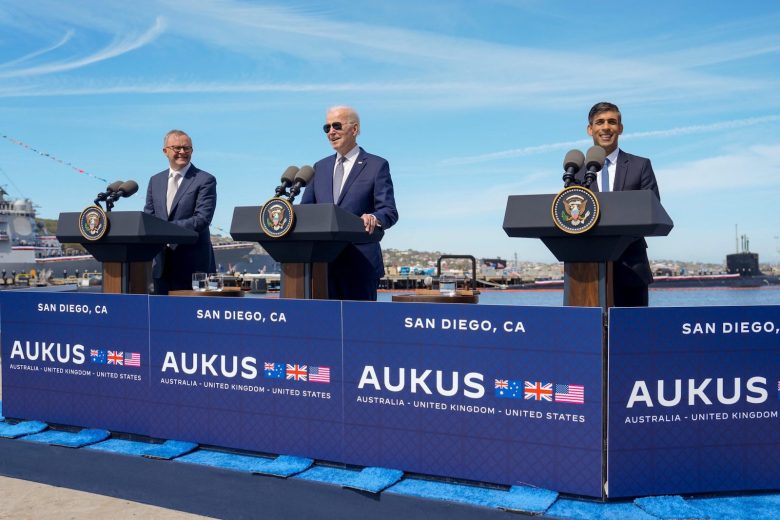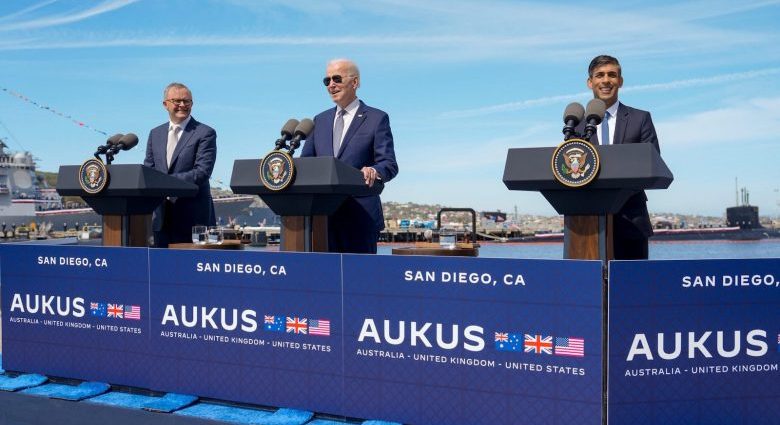At the beginning of 2023, Australia’s relationship with the People’s Republic of China appeared to be one of hostility across the board, in both military and economic terms.
In March, the Nine newspapers ran a series titled “Red Alert“, premised on the claim that China and Australia could be at war within three years. The allusion to communism was presumably intentional, even though it is now almost impossible to detect any trace of revolutionary fervor amid the old-fashioned nationalist rhetoric emerging from Beijing.
On the military front, the Albanese government had embraced the AUKUS agreement even more fervently than its predecessors. China perceives itself in the crosshairs of the trilateral arrangement, which it describes as “extremely irresponsible.”
In economic terms, China maintained its restrictions on Australian exports of coal, copper, sugar, cotton, wine and barley.
These restrictions – widely seen as an exercise in “wolf warrior” diplomacy – were imposed in 2020 in retaliation for then-prime minister Scott Morrison’s quixotic decision to press China on its supposed responsibility for the outbreak of the Covid-19 virus. Canberra followed up by banning Belt and Road Initiative projects, a central element of Xi Jinping’s geopolitical strategy.
In sum, the relationship between the Australian government and the PRC hit its lowest ebb in many years, arguably since the opening of diplomatic relationships in the 1970s. Hopes for a constructive relationship based on “doux commerce” seemed to have vanished.
But as the end of 2023 approaches, the economic picture looks radically different, even if the military sketch has stayed familiar. Most of the trade barriers have been removed and the rhetoric has been toned down.

The two sides have also resumed annual leader-level meetings. While the Albanese government has avoided explicit use of the term “reset,” other commentators have been happy to adopt this description.
This change reflects a return to more pragmatic thinking. Like most newly powerful countries, China initially overestimated its strength and believed its economic power enabled it to bully other countries into acquiescence on a range of issues. The Belt and Road Initiative, which produced the same kinds of hostile reactions as the over-reach of American multinationals in the mid-20th century, has been scaled back.
For Canberra, it became clear that the push for a Covid inquiry was a pointless act of self-harm. Exporters affected by Chinese retaliation were keen for a return to normality. Another important factor was the negative reaction of Chinese-Australians, an important voting bloc, to rhetoric that appeared directed against Chinese people in general, rather than against the Chinese government.
Talk of war in the short term has also dissipated, reflecting China’s realization that an invasion of Taiwan is not militarily feasible and will not become feasible any time soon. The stalemate in Ukraine, even after its summer counteroffensive, has been instructive for Xi. In 21st-century warfare, the defensive side has the advantage.
The miserable failure of Russia’s much-touted Black Sea Fleet provides an indication of how well a People’s Liberation Army invasion fleet, consisting largely of converted civilian ferries, would fare against Taiwan’s formidable array of anti-ship missiles.
Indeed, the “hedgehog” strategy now being adopted by Taiwan has been suggested by Lowy Institute researcher Sam Roggeveen as a model for an Australian “echidna strategy.”
Yet at the level of geopolitical “grand strategy” nothing seems to have changed. The AUKUS agreement is going ahead at full steam and appears set to overcome concerns in Washington about the risk of diverting submarines from the United States. Prime Minister Albanese has also embraced the Quad and its members enthusiastically.
But he has done little to make a case for these agreements, at least as far as national security is concerned. Albanese has focused on domestic politics, pitching AUKUS as a job creation program even though the skills that would be required are already in desperately short supply. As an economic policy, AUKUS does not make sense.
The inclusion of the United Kingdom in the deal looks like an expensive exercise in Anglospheric nostalgia. Whatever former UK prime minister Boris Johnson may have thought, there is no way a declining power on the other side of the planet can afford to maintain a large naval force to patrol the South China Sea.
Britain’s role in the deal will be to produce submarines for the use of its own navy, far away, with Australian purchases used to subsidize the fixed costs of such an expensive venture.

Putting a large proportion of Australia’s defense budget into weapons systems that won’t face the test of reality until around 2040, and for which no clear rationale has been offered, seems foolhardy. A serious assessment of the Australia-China relationship must involve a reconsideration of the AUKUS agreement. Sadly, there is no sign of this happening.
Nonetheless, whatever criticisms might be made of them, the Australian and Chinese governments have made significant progress and moved farther away from the pointless hostilities of recent years.
A return to normal trade relations should not prevent us from supporting democratic reform and opposing the oppression of groups like the Uighurs. But this should be part of a joint position taken by democratic governments, not a move in a geopolitical strategy driven by realpolitik.
John Quiggin is Australian Laureate Fellow at the School of Economics at the University of Queensland.
This article was originally published by East Asia Forum and is republished under a Creative Commons license.

